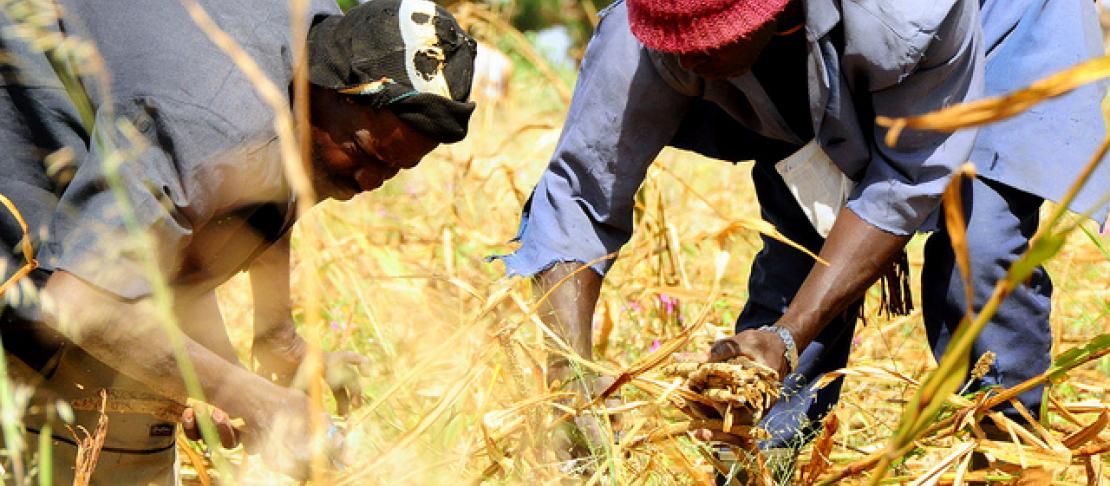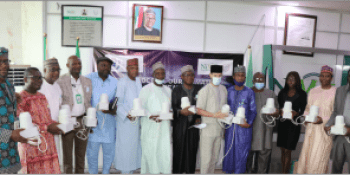New roadmap launched to help farmers cope with extreme weather and tap opportunities in agriculture

LAGOS, NIGERIA – A new report launched today outlines roadmap to expand insurance to help Nigeria’s smallholder farmers cope with extreme weather as they transition to more productive and profitable agriculture.
In Nigeria, 70% of the work force is engaged in agricultural activities. Agriculture contributes more than 40% of the country’s Gross Domestic Product. The roadmap – a contribution to the country’s National Agricultural Resilience Framework under the Nigeria’s Federal Ministry of Agriculture and Rural Development – outlines a series of steps to make new innovations in agricultural insurance available to more of the nation’s farmers.
“Farmers rely a huge amount on the climate,” said Dr. Robert B. Zougmoré, Africa Program Leader of the CGIAR Research Program on Climate Change, Agriculture and Food Security (CCAFS). “Drought or floods can wipe out their entire harvest – which represents an income for the year. If farmers can insure their crop, and get some financial support in the event that their harvest fails, that provide them with financial security – and food security.”
Insurance protects farmers from climate-related disasters. But it can also benefit them at times when weather conditions are favorable. “Insurance is not just about assisting farmers during climate-related disasters,” said Dr. James Hansen, leader of the CCAFS Climate Services and Safety Nets Flagship, at the International Research Institute for Climate and Society (IRI). “Reducing the risk of catastrophic loss during extreme climate events frees farmers to invest more in productive farming practices, and frees lenders to make credit more available to farmers.”
Index-based insurance is an innovation that triggers payouts based on an index that is correlated with agricultural losses, rather than actual losses. This reduces the costs of insuring smallholder farmers, and the delay in processing payouts. Experiences in Ethiopia, India, Kenya, Rwanda, Senegal and elsewhere show that when farmers use these products, they do invest in improved management, leading to better harvests and income.
The insurance roadmap outlines the steps needed, with support from public-private sector partnerships, to develop new index-based insurance products to protect Nigeria’s agricultural transformation from the impact of climate-related risks.
“This roadmap is the first of its kind to consolidate a wide range of evidence about what crops are most at risk, and during which times in the crop cycle,” said Dr. Debisi Araba, Africa Regional Director for the International Center for Tropical Agriculture (CIAT).
“With that evidence, we can work with the financial sector to define what constitutes a climate disaster, so they can regulate pay-outs and an index-based insurance scheme. We can also support financial lenders to help farmers pay the money back over a longer-time period, like after a good season and good harvest,” he said.
The roadmap also outlines next steps to fast-track inclusive insurance for Nigeria’s agriculture sector. These include forming a public sector task force to champion insurance for smallholders; providing incentives for public and private sector to manage high costs for the new products; and introducing a pilot phase to introduce lenders, farmers and policy makers to the initiative.
“Where most clients of financial lenders can provide details of a salary, farmers can’t depend on a salary from their harvest because the weather could destroy it,” said Dr. Jonathan Hellin, Senior Scientist at the International Maize and Wheat Improvement Center (CIMMYT).
“It’s time that changed - and in Nigeria, we are making excellent headway with this roadmap which should go some way to iron out high transaction costs, processing delays and the lack of financial assets that really disadvantage farmers compared with other borrowing clients.”
Today’s launch strengthens the role of insurance in Nigeria’s agricultural resilience policy, through improved data management and sharing, and by building awareness among farmers and the financial sector to support new insurance and financial packages for farmers.
Download the full report: Hansen JW, Hellin J, Goslinga R. 2017. A roadmap for evidence-based insurance development for Nigeria’s farmers. CCAFS Working Paper no. 218. Wageningen, Netherlands: CGIAR Research Program on Climate Change, Agriculture and Food Security (CCAFS). Available online at: www.ccafs.cgiar.org
“A Roadmap for evidence-based insurance development for Nigeria’s farmers” is a product of the CCAFS Flagship on Climate Services and Safety Nets, in partnership with CGIAR Centers CIMMYT, ICRISAT and CIAT. The work was carried out with support from CGIAR Fund Donors and through bilateral funding agreements (visit https://ccafs.cgiar.org/donors), and funded in part by UK aid from the UK government. The views expressed in this document cannot be taken to reflect the official positions of these organizations.
The CGIAR Research Program on Climate Change, Agriculture and Food Security (CCAFS) - led by the International Center for Tropical Agriculture (CIAT), brings together some of the world’s best researchers in agricultural science, development research, climate science and Earth System science, to identify and address the most important interactions, synergies and tradeoffs between climate change, agriculture and food security. CGIAR is a global agriculture research partnership for a food secure future. Its research is carried out by 15 CGIAR centers in close collaboration with hundreds of partner organizations.
The International Center for Tropical Agriculture (CIAT) - a CGIAR Research Center – develops technologies, innovative methods and new knowledge that better enable farmers, especially smallholders, to make agriculture eco-efficient: competitive and profitable as well as sustainable and resilient. Eco-efficient agriculture reduces hunger and poverty, improves human nutrition and offers solutions to environmental degradation and climate change in the tropics. Headquartered near Cali, Colombia, CIAT conducts research for development in tropical regions of Latin America, Africa and Asia.
The International Crops Research Institute for the Semi-Arid Tropics (ICRISAT) - a CGIAR Research Center – conducts agricultural research for development in Asia and sub-Saharan Africa with a wide array of partners throughout the world. ICRISAT and its partners help empower those living in the semi-arid tropics, especially smallholder farmers, to overcome poverty, hunger, malnutrition and a degraded environment through more efficient and profitable agriculture. ICRISAT is headquartered in Patancheru near Hyderabad, India, with two regional hubs and five country offices in sub-Saharan Africa.
The International Maize and Wheat Improvement Center (CIMMYT) - a CGIAR Research Center known by its Spanish acronym, works to reduce poverty and hunger by sustainably increasing the productivity of maize and wheat in the developing world. CIMMYT maintains the world’s largest maize and wheat seed bank and is best known for initiating the Green Revolution, which saved millions of lives across Asia and for which CIMMYT’s Dr. Norman Borlaug was awarded the Nobel Peace Prize.
The International Research Institute for Climate and Society (IRI) - part of the Earth Institute at Columbia University, aims to enhance society’s ability to understand, anticipate and manage the impacts of climate in order to improve human welfare and the environment, especially in developing countries.


